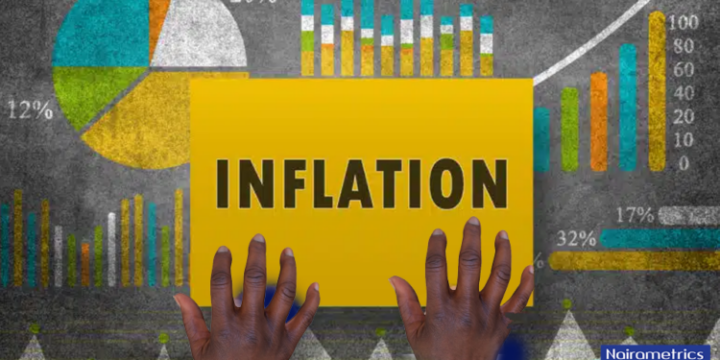Nigeria’s economic landscape has been significantly impacted by the latest data release from the National Bureau of Statistics (NBS) in their recently unveiled Consumer Price Index (CPI) report for September 2023. The statistics reveal a surge in inflation, which has climbed to 26.72%, marking a 0.92% increase from the previous month’s rate of 25.80%.
This concerning uptick in inflation has sent ripples throughout the nation, with various sectors and individuals feeling the financial strain of this economic phenomenon. The underlying factors contributing to this surge in inflation are primarily linked to the removal of petrol subsidies and the devaluation of the official exchange rate. These policy shifts have had a profound impact on consumer prices, leading to this substantial uptick in inflation.
A closer examination of the data reveals that the month-on-month inflation rate has surged to 2.18%, marking a notable 1.08% difference from the preceding month of August. This sharp increase in the monthly rate is a clear indication of the rapid pace at which inflation is escalating, posing significant challenges for consumers and policymakers alike.

The breakdown of year-on-year inflation contributions provides valuable insights into the specific sectors that are driving this surge. Notably, Food and non-alcoholic beverages have assumed the largest share, contributing a substantial 13.84% to the overall inflation rate. Following closely is the housing, water, electricity, gas, and other fuels category, accounting for 4.47% of the inflation rate, while clothing and footwear make a notable contribution of 2.04%.
In September 2023, urban inflation soared to 28.68%, marking a stark 7.43% increase from the 21.25% recorded in the same month of the previous year, September 2022. On the other hand, rural inflation reached 24.94%, indicating a 4.62% increase from the rate of 20.32% observed in September 2022. These figures underscore the widespread impact of inflation, affecting both urban and rural areas and adding to the challenges faced by all segments of the population.
Food inflation, a crucial aspect of overall inflation, witnessed a significant rise, surging to 30.64% in September 2023. This represents a 1.30% increase from the previous month and a substantial 7.30% rise compared to the corresponding period in 2022. The month-on-month analysis also reveals that food inflation in September 2023 reached 2.45%, which is 1.41% lower than the rate observed in August 2023 (3.87%). This reduction in month-on-month food inflation can be attributed to a decrease in the rate of growth in the average costs of specific food items such as Potatoes, Yam, and other tubers, Bread and cereals, Fruits, as well as Fish.
The annual rate of food inflation, calculated for the twelve months ending in September 2023, averaged 25.65%, reflecting a significant increase of 6.29% from September 2022 when it stood at 9.36%. This alarming increase underscores the persistent and growing challenges faced by consumers in accessing affordable food, further highlighting the urgent need for effective policy measures to address this issue.
For the category of “All items less farm produce and energy,” which excludes volatile agricultural produce prices and energy costs, the year-on-year rate reached 21.84% in September 2023. This represents a noteworthy increase of 4.35% compared to September 2022 when it stood at 17.49%. On a month-on-month basis, the Core Inflation rate for September 2023 was 2.22%, a slight uptick from the rate of 2.18% observed in August 2023. The twelve-month annual inflation rate for the period ending in September 2023 averaged 19.55%, marking a significant 4.48% point increase from September 2022. This broad-based rise in inflation is felt across various consumer sectors and highlights the growing cost-of-living challenges.
Among the notable price increases observed, some of the most significant occurred in the costs of Passenger Transport by Road, Passenger Transport by Air, Medical Services, Furniture Repair, Maintenance, and the repair of personal transport equipment, among others. These increases are indicative of the challenges faced by consumers in accessing essential services and maintaining their standard of living.
In terms of regional disparities, the inflation landscape differs significantly from state to state. For September 2023, the highest year-on-year all items inflation rates were observed in Kogi (32.95%), Rivers (30.63%), and Lagos (30.04%). In contrast, Borno (21.05%), Jigawa (22.39%), and Benue (23.22%) reported the most gradual increases in headline inflation on a year-on-year basis. These regional variations reflect the complex economic dynamics at play across the country, as well as the diverse challenges faced by different states in managing inflation.
Food inflation, a critical aspect of the overall inflation rate, also exhibits regional disparities. In September 2023, the highest year-on-year Food inflation rates were recorded in Kogi (39.37%), Rivers (35.95%), and Lagos (35.66%). On the other hand, Jigawa (23.41%), Borno (25.29%), and Sokoto (25.38%) reported the most modest increases in Food inflation on a year-on-year basis. These variations underscore the diverse economic landscapes and challenges faced by different states in managing food prices and ensuring food security for their populations.
In conclusion, the latest data from the National Bureau of Statistics paints a concerning picture of the inflationary pressures facing Nigeria. The surge in inflation, attributed to the removal of petrol subsidies and the devaluation of the official exchange rate, has far-reaching consequences for consumers, businesses, and policymakers. As inflation continues to rise, urgent and effective measures are needed to address these challenges, mitigate their impact, and ensure the economic well-being of all Nigerians.
Support InfoStride News' Credible Journalism: Only credible journalism can guarantee a fair, accountable and transparent society, including democracy and government. It involves a lot of efforts and money. We need your support. Click here to Donate
